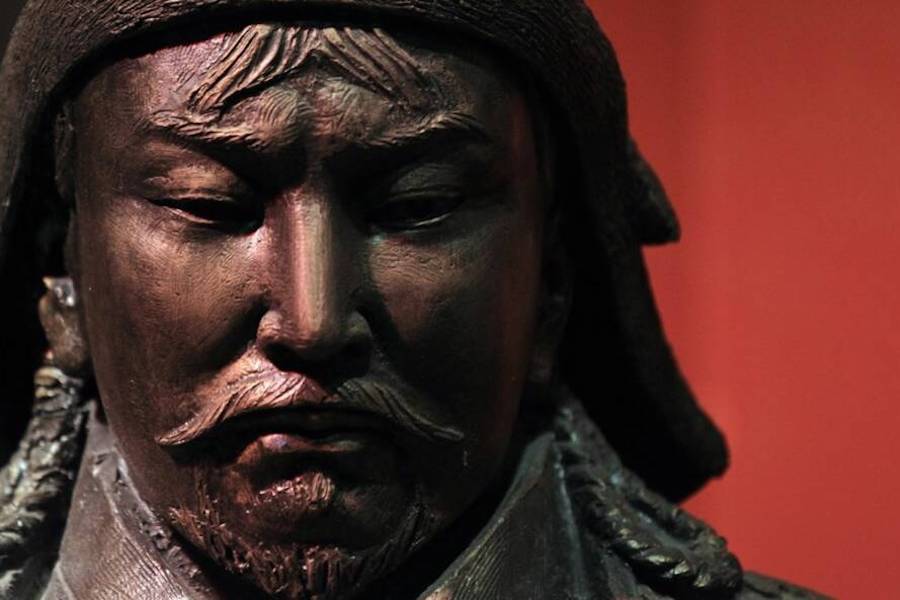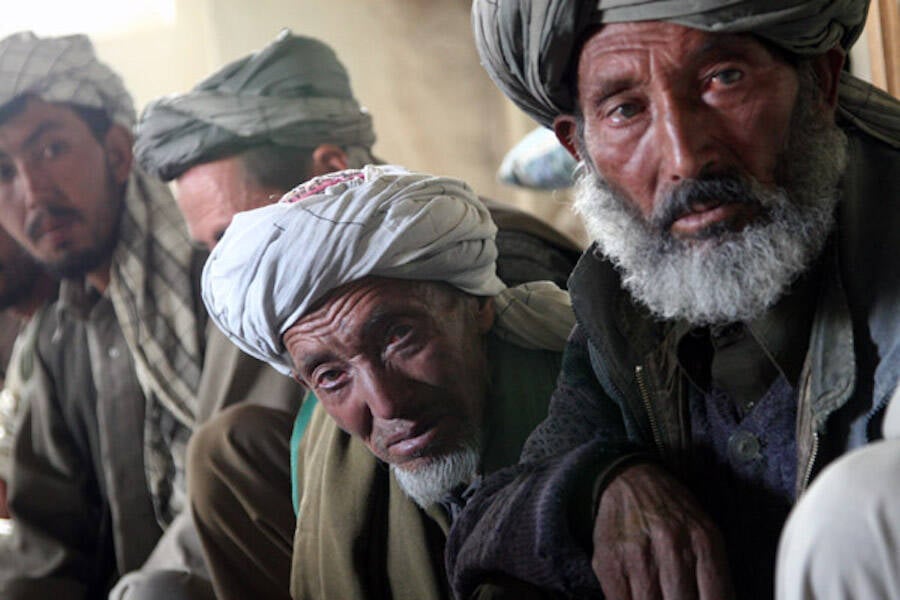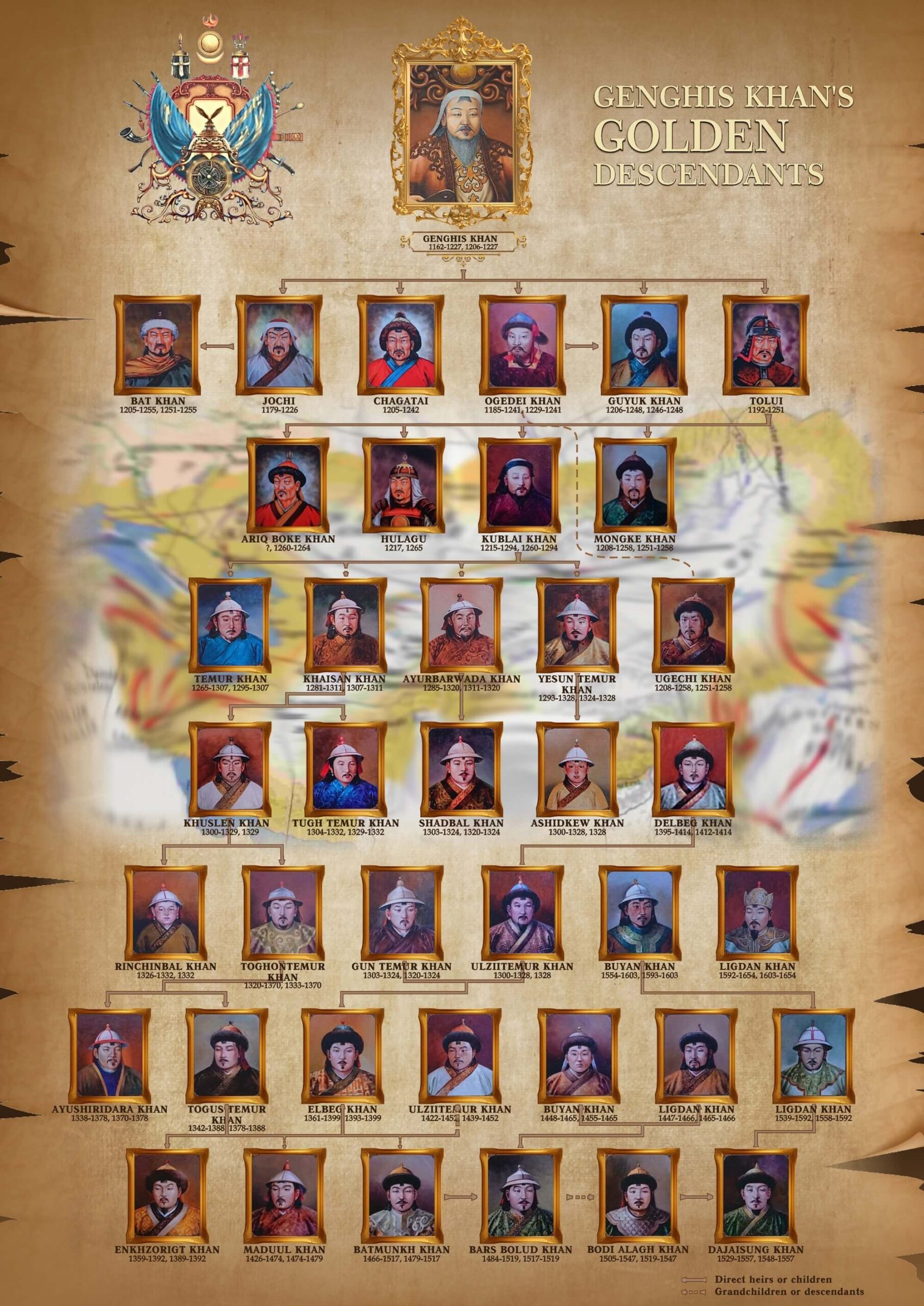Genghis Khan Children: Unveiling The Legacy Of One Of History's Greatest Conquerors
When we talk about Genghis Khan, we're not just talking about a historical figure but a legend whose influence still resonates through the corridors of time. His name alone evokes images of vast empires, relentless conquests, and a legacy that continues to fascinate historians and enthusiasts alike. But beyond the battlefield and the politics of power lies a more personal side of this iconic ruler—his children. Who were they? What roles did they play in shaping the Mongol Empire? And how did Genghis Khan's lineage influence the world as we know it today? Let's dive into the fascinating world of Genghis Khan's children and uncover the secrets of their lives.
Now, if you're thinking this is just another history lesson, think again. This is the story of a man who not only changed the world but also left behind a family tree so vast and intricate that it could rival any modern-day drama. So grab your seat, because we're about to embark on a journey through the lives of Genghis Khan's children, where power, politics, and personal relationships collide in ways you'd never imagine.
Before we dive deeper, let's set the stage. Genghis Khan, born as Temujin, rose from humble beginnings to become one of the most feared and respected leaders in history. But his journey wasn't just about building an empire; it was also about creating a legacy that would outlast him. And at the heart of that legacy were his children, who played crucial roles in shaping the future of the Mongol Empire. So, are you ready to explore the lives of Genghis Khan's children? Let's get started!
Read also:Justine Bateman Children Unveiling The Life And Legacy
The Man Behind the Empire: A Brief Biography of Genghis Khan
Before we delve into the lives of Genghis Khan's children, it's essential to understand the man behind the legend. Born in 1162 in the steppes of Mongolia, Genghis Khan's early life was anything but easy. Orphaned at a young age and forced to endure the harsh realities of nomadic life, he rose from obscurity to unite the warring tribes of Mongolia under one banner. By 1206, he had established the Mongol Empire, which would eventually become the largest contiguous land empire in history.
But Genghis Khan wasn't just a conqueror; he was a visionary leader who revolutionized military tactics, governance, and trade. His innovations laid the foundation for a globalized world long before the term even existed. And as his empire expanded, so did his family, with his children playing pivotal roles in its administration and expansion. So, who exactly were these children, and what impact did they have on the Mongol Empire?
Let's take a closer look at the family dynamics of one of history's greatest emperors. Here's a quick rundown of Genghis Khan's children, presented in a table for your convenience:
| Name | Mother | Role | Legacy |
|---|---|---|---|
| Jochi | Borte | Eldest son, ruler of the Ulus of Jochi | Founder of the Golden Horde |
| Chagatai | Borte | Second son, ruler of Central Asia | Preserved Mongol traditions |
| Ogedei | Borte | Third son, Great Khan of the Mongol Empire | Expanded the empire significantly |
| Tolui | Borte | Youngest son, father of Kublai Khan | Produced influential descendants |
| Others | Various wives and concubines | Variety of roles in the empire | Spread Mongol influence widely |
Genghis Khan's Children: The Key Players
Jochi: The Eldest Son and His Contested Lineage
Let's start with Jochi, Genghis Khan's eldest son. Born to Borte, Genghis Khan's first wife, Jochi's legitimacy has been a subject of debate among historians. Some speculate that he may not have been Genghis Khan's biological son due to Borte's capture by the Merkit tribe before their marriage. Nevertheless, Jochi was acknowledged as Genghis Khan's son and played a crucial role in the empire's expansion.
Jochi was given the vast northern territories, including modern-day Kazakhstan and parts of Russia. His descendants formed the Golden Horde, which became one of the most powerful khanates within the Mongol Empire. Despite the controversy surrounding his lineage, Jochi's contributions to the empire cannot be overstated. His military prowess and leadership skills helped solidify Mongol control over these regions.
Chagatai: The Enforcer of Tradition
Chagatai, the second son of Genghis Khan, was known for his adherence to Mongol traditions. After Genghis Khan's death, Chagatai was responsible for maintaining the empire's cultural and political integrity. He ruled over Central Asia, a region that included modern-day Uzbekistan, Tajikistan, and parts of Afghanistan.
Read also:Nicole Watterson Full Name The Ultimate Guide To Her Life And Career
Chagatai's domain became known as the Chagatai Khanate, which played a vital role in preserving Mongol customs and practices. His commitment to tradition ensured that the Mongol way of life continued to thrive even as the empire expanded into new territories. Chagatai's influence can still be seen in the cultural heritage of Central Asia today.
Ogedei: The Great Khan Who Expanded the Empire
Ogedei, the third son of Genghis Khan, succeeded his father as the Great Khan of the Mongol Empire. His reign marked a period of significant expansion, with Mongol forces conquering parts of China, Persia, and Eastern Europe. Ogedei was known for his strategic acumen and ability to unite disparate factions within the empire.
Under Ogedei's leadership, the Mongol Empire reached its zenith, becoming the largest contiguous land empire in history. His administration was marked by a focus on trade and commerce, which helped bolster the empire's economy. Ogedei's reign also saw the establishment of the Pax Mongolica, a period of relative peace and stability that facilitated trade and cultural exchange across the empire.
Tolui: The Father of Kublai Khan
Tolui, the youngest son of Genghis Khan, may not have held the title of Great Khan, but his influence on the empire was profound. Tolui's descendants included some of the most famous figures in Mongol history, including Kublai Khan, the founder of the Yuan Dynasty in China, and Hulagu Khan, the conqueror of Persia.
Tolui's role in the empire was primarily administrative, and he was responsible for overseeing the empire's military and economic affairs. His descendants went on to play key roles in shaping the future of the Mongol Empire, ensuring that Genghis Khan's legacy endured long after his death.
The Impact of Genghis Khan's Children on the Mongol Empire
Division of the Empire
After Genghis Khan's death in 1227, his empire was divided among his sons, with each receiving a specific territory to rule. This division was not without its challenges, as the sons often found themselves at odds with one another. However, it also allowed for the empire's continued expansion and administration, as each son brought their unique strengths to the table.
The division of the empire into khanates ensured that the Mongol way of life was preserved across vast regions. It also facilitated the integration of diverse cultures and traditions into the Mongol Empire, creating a rich tapestry of influences that shaped the empire's identity.
Expansion and Administration
Genghis Khan's children played crucial roles in the empire's expansion and administration. From military conquests to diplomatic relations, each son contributed to the empire's growth and stability. Their leadership skills and strategic vision helped solidify Mongol control over vast territories, ensuring the empire's survival for generations to come.
Moreover, the children of Genghis Khan were instrumental in establishing trade routes and fostering cultural exchange across the empire. The Silk Road, a network of trade routes connecting East and West, flourished under Mongol rule, facilitating the exchange of goods, ideas, and technologies.
Cultural and Political Influence
The children of Genghis Khan also had a significant impact on the cultural and political landscape of the Mongol Empire. Their commitment to preserving Mongol traditions while embracing new ideas and practices helped create a dynamic and adaptable society. This fusion of old and new allowed the empire to thrive in an ever-changing world.
Furthermore, the children of Genghis Khan were instrumental in shaping the political structure of the empire. Their leadership styles and governance models influenced future generations of Mongol rulers, ensuring that the empire remained a dominant force in world history.
Legacy of Genghis Khan's Children
Genetic Legacy
One of the most fascinating aspects of Genghis Khan's children is their genetic legacy. Studies have shown that a significant portion of the world's population can trace their ancestry back to Genghis Khan and his descendants. This genetic legacy is a testament to the vast reach of the Mongol Empire and the intermingling of cultures that occurred under its rule.
The genetic legacy of Genghis Khan's children can be seen in the diverse populations of modern-day Mongolia, China, Central Asia, and beyond. It serves as a reminder of the lasting impact of the Mongol Empire on the world's cultural and genetic landscape.
Historical Legacy
The historical legacy of Genghis Khan's children is equally impressive. Their contributions to the Mongol Empire's expansion, administration, and cultural development have left an indelible mark on world history. From the establishment of trade routes to the preservation of Mongol traditions, the children of Genghis Khan played pivotal roles in shaping the world as we know it today.
Their legacy can be seen in the cultural heritage of the regions they ruled, as well as in the political and economic systems that evolved under their influence. The Mongol Empire, and by extension, the children of Genghis Khan, helped lay the foundation for a globalized world, where ideas, goods, and technologies could flow freely across borders.
Conclusion: The Enduring Legacy of Genghis Khan's Children
As we've explored the lives of Genghis Khan's children, it becomes clear that their impact on the Mongol Empire and world history cannot be overstated. From their roles in expanding and administering the empire to their contributions to cultural and political development, the children of Genghis Khan played crucial roles in shaping the world as we know it today.
So, what can we learn from the legacy of Genghis Khan's children? First and foremost, they remind us of the power of leadership, vision, and adaptability in overcoming challenges and achieving greatness. Their ability to unite diverse cultures and traditions under one banner serves as a testament to the strength of collaboration and mutual respect.
As you reflect on the lives of Genghis Khan's children, we invite you to share your thoughts and insights in the comments below. What aspects of their legacy resonate with you the most? How do you think their contributions have influenced the world today? And don't forget to check out our other articles for more fascinating stories from history!
Daftar Isi
- The Man Behind the Empire: A Brief Biography of Genghis Khan
- Genghis Khan's Children: The Key Players
- Jochi: The Eldest Son and His Contested Lineage
- Chagatai: The Enforcer of Tradition
- Ogedei: The Great Khan Who Expanded the Empire
- Tolui: The Father of Kublai Khan
- The Impact of Genghis Khan's Children on the Mongol Empire
- Legacy of Genghis Khan's Children


